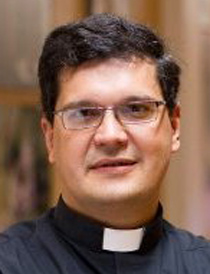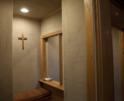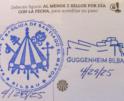
Faith
When it comes to Advent, then, it is fair to ask: What are we anticipating? What answer, longing or hope are we waiting for?

Medina
Within hours of Black Friday, if not sooner, streets become adorned with Christmas lights, coffee cups change color and stores ready for another holiday season; the Advent season begins.
The liturgy of Advent, with its songs and prayers, emphasizes that we are in a time of waiting, as do the prayers from the Roman Missal. In them, we beg for the resolve to run forth unburdened by earthly undertakings, eagerly pressing forward in haste to meet the Lord. Every detail reminds us to prepare in anticipation.
Anticipation is an important aspect of happiness. An undesired or unannounced visit is a hassle, an answer to a question that wasn't asked is an annoyance. At the same time, increased anticipation makes the resolution even sweeter.
In the words of Winnie-the-Pooh, "Although eating honey was a very good thing to do, there was a moment just before you began to eat it which was better than when you were."
When it comes to Advent, then, it is fair to ask: What are we anticipating? What answer, longing or hope are we waiting for?
Consequently, we may end up asking, What is the ultimate meaning of existence? Why is there pain and death? Why is life ultimately worth living? What is reality made for? What are we looking for?
These questions, hopes and longings reflect the cry for fulfillment behind every human effort, but today they are easily taken for granted. Without them, without the unquenchable longing for the infinite within man, the Christian revelation will always be regarded as uninteresting.
In fact, Reinhold Niebuhr writes that one-half of the people in world regard the Christian answer as uninteresting because they have "no questions for which the Christian revelation is the answer and no longings and hopes which that revelation fulfills."
Christ needs to meet the human -- the unquenchable aspiration -- that vibrates within each person. Asking questions was central to Jesus' teaching. As portrayed in the Gospels, he did not come simply to communicate a message, but to engage every person in a deep dialogue.
It is telling that in John's Gospel, Jesus' first recorded statement is a question: "What are you looking for?" (Jn 1:38), which he will ask three more times.
We are reticent to take these questions into consideration. We find them unsettling because we don't have ready answers. Instead of embracing the questions, we'd rather dismiss them or reduce them to something achievable. A mother's desire for her child's happiness, for example, is often reduced to the achievable desire for safety or success.
Those questions and desires make us aware of our finitude and poverty. The more seriously we take our longing, desire and questions, the more we become aware of being needy beggars seeking a fulfillment out of our reach.
Yet, they arise when least expected, especially in those moments of great joy and sorrow. They are expressions of our nature and nothing can eradicate them from life.
The poet Rainer Maria Rilke wrote to his young friend: "Bear with patience all that is unresolved in your heart, and try to love the questions themselves, as if they were rooms yet to enter or books written in a foreign language. Don't dig for answers that can't be given you yet: you cannot live them now. For everything must be lived. Live the questions now, perhaps then, someday, you will gradually, without noticing, live into the answer."
Advent is a privileged time to allow the human to be reawakened within us, to love the questions that life opens, to embrace our fragility and need for Another to respond to them.
In his latest book, "Disarming Beauty," Father Julian Carron writes: "Christ came into the world to call man back to the depths of all questions ... (for) Christ proposes himself as the answer to what 'I' am and only an attentive, tender and impassioned awareness of my own self can make me open and lead me to acknowledge, admire, thank and live Christ."
FATHER MEDINA IS NATIONAL LEADER OF THE CATHOLIC ECCLESIAL MOVEMENT COMMUNION AND LIBERATION.
- Father José Medina has devoted much of his professional career to the world of education first as teacher of Math and Science and as Principal in Washington DC and Boston. He is a native of Spain and a member of the Priestly Fraternity of the Missionaries of St. Charles Borromeo. He received his civil engineering degree from the Universidad Politécnica de Madrid, a Bachelors of Sacred Theology from the Pontificia Università Lateranense in Rome, Italy and a Master in Education from the Harvard Graduate School of Education. Currently, Father Medina is the national leader of the Catholic ecclesial movement Communion and Liberation.
Recent articles in the Faith & Family section
-
7 reasons to pray for the cardinals in conclaveJaymie Stuart Wolfe
-
Legacies in Ordinary TimeLucia A. Silecchia
-
What are my Easter duties?Jenna Marie Cooper
-
On the Camino: Jentillaks and jazzMark T. Valley
-
From the Eternal CityArchbishop Richard G. Henning























